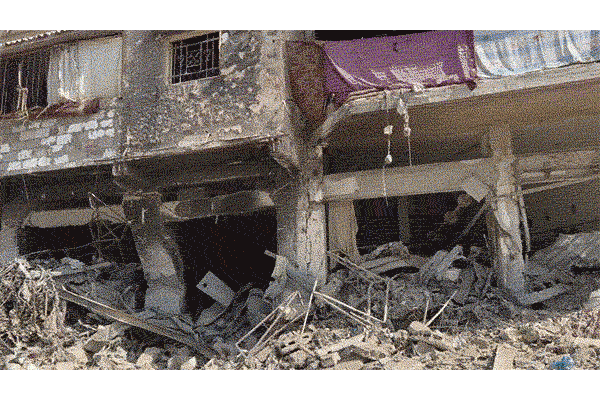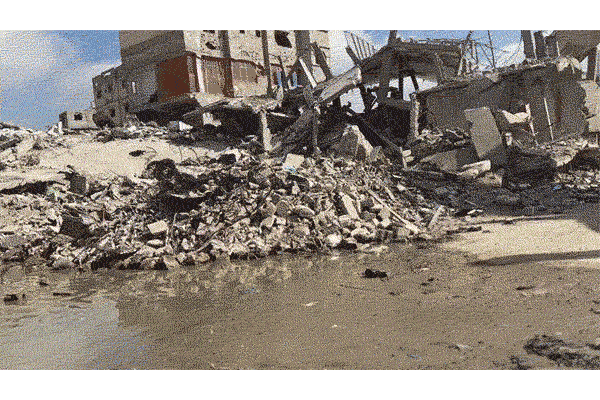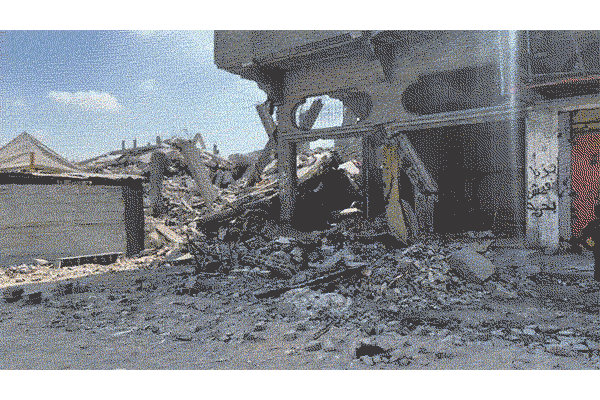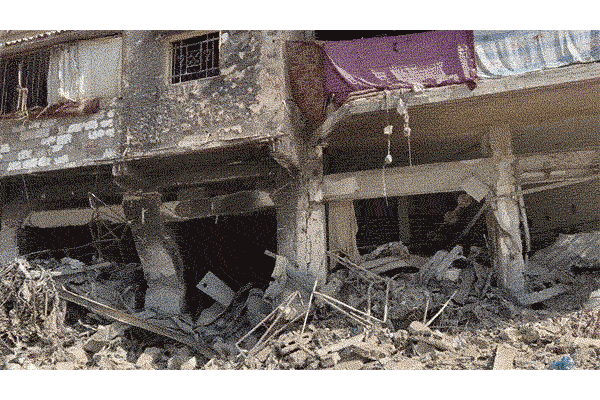Before Oct. 7, I used to see the streets of Gaza as very beautiful, with its many new projects and buildings, its luxurious restaurants and thriving businesses. It used to make me smile; when the taxi driver took me around in those streets, I was proud that there was life in Gaza, despite the many wars it has experienced.
But I also had a great fear that another war would come and destroy all of this. We live in a constant state of fear. This isn’t the first war where we’ve been displaced. And I, too, got used to it, though I didn’t like it. I was one of the stubborn ones. Previously, I had always told my family that I did not want us to leave our home when there is a war in Gaza. I do not like being displaced and its difficult circumstances. I want to die at home—but the wish remains only words. A person continues to fight for survival. During this war, I’ve relented. We’ve tried displacement several times, all in order to escape death.
I am 30 years old, and I have a small family, two sisters and one brother. One of my sisters is married and has two children. My sister lives west of the city of Khan Yunis, while I live in the east of it, in the area next to the European Hospital. At the beginning of the war, we began to suffer from a lack of water. I started carrying large gallons to the second floor to fill the water tanks on the roof of the house, using a rope pulled by my brother or father. I wash our clothes by hand up there, because there is no electricity to operate the washing machines. There is also no gas for cooking; so many are forced to light a fire in order to cook food, the food that we have all craved, because it has been banned from entering the Gaza Strip. I do not like the canned food spread in the market and distributed as aid to the people of Gaza. My stomach does not accept it, and neither does my family. For a time, we were trying to cook some simple dishes from vegetables, and we relied more on cheese sandwiches.
It is a very different war. I live between the cities of Khan Yunis and Rafah. When the ground operation began in the city of Khan Yunis last December, my area was separated from the city. We could not go there the normal way, on the main road. But we were looking for other ways that we could go, to check on my sister, who was staying in the city’s refugee camp. The communications outage was a major obstacle, and we had great fear and anxiety that we would lose someone, possibly even without knowing it, if we didn’t do something. So we decided: We would venture to Khan Yunis, even if it wasn’t allowed. We would make sure my sister was OK and come back.
On our way, we heard the sounds of intense bombardment in the city, heavy missiles and powerful explosions. Eventually the assault forced us to flee to the nearby European Hospital because the danger of being hit with shrapnel became too great. The bombs were powerful, and they reached our residential area. Fleeing, though, was not a good option either—it was dangerous. We could die trying to reach the hospital. But I felt forced to do so because my mother, who is in her 50s, has a spinal cord disease, and her movement is very weak. She was afraid that an explosion would come soon, hindering her ability to escape death. So I went with her to the hospital, and we took shelter for her safety.
When we arrived, we could not find a place to stay because of the large number of displaced people there, and we spent the night in the building’s garage. I felt humiliated at the time that I was near my house and could not sleep in it. I was looking at my mother, who was frozen from the cold, and praying that the time would pass. It was a difficult and very cold night. So difficult that at dawn, we decided we couldn’t do this night after night, or even one more night. So we returned home, with warplanes and drones overhead, but we got back quickly and survived.
The many explosions in the city did not stop. I was wondering whether we would know our city after this ground operation. Will our favorite places be destroyed, or will they survive? Many questions were killing us. We knew there was intense bombing all around us, but we didn’t really know what was happening to the city.
In January, a month after the start of the ground operation in Khan Yunis, my sister was forced to move from her home to our home—from the west of the city to its east—because the Israeli army had penetrated the camp where she lived. This was the camp in which I was born and lived for eight years. I left it in the year 2000 because the Israeli army bulldozed it. We spent two years homeless and displaced before we moved to live in our current home. Still, the storming of the camp during this war was a shock to me. It’s where my sister’s house has always been, where she gave birth to her two children, Adam and Rital, who are still just 3 and 5 years old. She came to us fleeing from death. She describes the scene of her displacement from the camp like an action movie: Tanks were shooting at their car, and the car driver was forced to keep going over the bodies of citizens who were killed.
Once my sister arrived, we were trying to support her psychologically, telling her that her house would not be harmed, and that she was with us and we would all be fine. But inside me there was great concern that the army would ask my area to evacuate, too. Then where would we go? We had already failed to travel through the Rafah land crossing into Egypt when we tried in May. So we came back. Nowhere is safe. My mother is very sick and the war conditions are difficult, and we are trying to endure. We live with it, but it makes all of our bodies very tired.
Unfortunately, we were wrong. My sister lost her house. It was severely damaged and became unfit for living during the ground operation. Many people spoke in shock about the massive destruction that befell Khan Yunis, and the Israeli army was proud of decimating it, but I had not seen it yet. I was running away. My brother, father, and brother-in-law were saying that the city was completely destroyed. There was nothing left that we knew. The streets had erased their features. After the Israeli army withdrew in March, I finally went, and I saw it. I was stunned.

My taxi passed through the streets as we approached the city, and I was in a state of shock. There were some intersections that were so well known to us, that were considered some of the city’s transportation centers. There was a mall where I used to buy fruit, vegetables, and cleaning supplies that was newly opened a year before the war. It was a beautiful project and a comfortable space; I could find everything we needed there and return home quickly after a long day of work.
Now I can’t find anything. It’s all gone. The streets had become sandy, and there were mountains of sand. I wondered how the army had the free time to create this devastation with bulldozers. The schools are also destroyed. In the center of the city, which we call the vital and commercial center, there is nothing intact. Everything is destroyed and not fit for use at all. You feel that this area was struck by a huge earthquake. The entire city, without exception, is destroyed, and what remains of it is uninhabitable. Nothing has survived.
Ten days before writing this, at the beginning of July, the Israeli army asked the eastern areas of the city of Khan Yunis to evacuate and move to the west of the city. This city, where a ground military operation took place for three months at the beginning of the year, was completely destroyed. But the army requested evacuation again. It’s baffling; what is left to destroy? My residential area is among those being asked to flee again. Hearing it, I felt that my soul was being taken from me. I was looking at my mother, who was crying bitterly. Everyone was crying, and the question was the same: Where should we go? My sister, whose house was so damaged, was crying but trying to help us find a place. She suggested that we go to the apartment she’d moved into and make a little room to stay there—better there than in the tents, because our mother is still sick. She cannot survive in the tents. There was no place else for us, so we accepted.
We thought we had endured enough from the heavy bombing of Khan Yunis, and then during the ground operation in Rafah—remember that at first, we lived between the two cities. At each stage, we could hear the heavy bombing in the area around us, and then we had to endure the displacement yet again. When it came time to flee once more, I did not sleep all that night.
Everyone was trying to collect important things, and I was in a deep state of sadness and pain. I escaped death several times during the past wars. How would I leave my home yet another time? Would I ever return to it, or not? This hurt my heart. I was exhausted.
I heard the sound of intense bombing. That night passed with difficulty. In the morning, we started transferring our belongings to a truck. All the neighbors left their homes and moved their belongings. I could hear the echo of my voice because the area had become empty of residents. We moved our belongings, said goodbye to our home, and got into the truck.
The road was long, and the destruction all around us was great. My mother looked at it in shock; it was the first time she had seen the city after the army’s withdrawal. The road was overwhelmed, thousands of displaced people in cars and trucks, many of them walking on foot. There were no cars to transport them due to the extreme lack of fuel. My heart was crying at this scene. I hear my mother’s voice speaking and asking: What was here? Where is that place? In other ways I was entering the city as if it were the first time. The driver asked passersby where this and that road leads. We have all lost the landmarks of the city, and know nothing about it now.


We arrived at my sister’s home, an apartment on the fourth floor. The building was burned, but her place was the most destroyed. It was the first time I had entered it. The kitchen was burned, and the walls had been consumed by fire. The walls of all the rooms were destroyed. But we began to reclaim the place. We closed the walls with reinforced nylon. We tried to clean the kitchen from the ashes of the fire, though fully clearing it was impossible. It was still so dangerous. The walls were cracked by shells and missiles, and when a place next to us was bombed, we felt that the house would fall on us.
The apartment was in the same camp we had lived in as children, the one we left in 2000. In that way it was a homecoming, though not our first. We’d returned to that camp in every war when we had to flee. So this place received us again, even though it, too, was completely destroyed. It was the only safe place, or at least, the safest of the options. This camp has known us since our childhood, and it knows that there is no other place for us. Our old house is gone. The infrastructure is destroyed. There is no water. You need to walk several kilometers to get water just for daily use. The sight of rubble, dust, and smoke from fires and the sound of bombing are terrifying, but we are trying to live. We have no other choice. We cannot escape to another place in order to breathe a little and feel safe. The crossings are closed.


People in the camp have been waking up in the dawn hours to fetch water from faraway places. The surrounding area is flattened. The neighbors are trying to return to what remains of their homes, as we did to my sister’s apartment. My sister helps clean the neighbors’ places, and I can hear the sounds of stones and rubble coming out of the people’s homes as she works. The thing that has transfixed me most is one of the neighbors whose building was destroyed. I think it was three or four floors tall. The house was targeted by several missiles, and is not suitable for living at all. It has no walls; the floor columns are damaged and may fall at any moment. But these people—they were cleaning the second floor in order to put a tent inside it and live in it. It is difficult for anyone to leave their house, the house that was their safety, their dreams, and the future. That is why the people in the camp chose to return to their homes, even if they were unfit for living. The nostalgia for it is fatal.
The sound of rubble being thrown aside from houses used to bother me very much. It felt like my dreams were being thrown away. I would look out the window at that house and find the family sitting on a sofa and lighting a fire in front of them to prepare tea or coffee. Some of us used to joke when lighting a fire to keep warm that it was summer now; winter was over. A very silly joke in a very painful and sad reality. I used to wake up to the sound of gas cylinders that people were trying to fill, even if it was with a very small amount of gas.
Everything is very difficult. Nothing we get is easy. We get tired when we walk a few steps, because our health is bad due to the lack of food and because the streets have become ugly. The atmosphere is very polluted. Sand dust and smoke from fires and cars make breathing difficult. Taxis no longer transport us. Modern cars are the only cars that operate now, because the motors can carry cooking oil instead of fuel. There is really no fuel for cars in Gaza due to the closure of the crossings, and when it shows up, its price is very high. A liter of diesel costs $30. This is a large sum for a taxi driver.
I am still waiting to return to my home again. I still feel like a stranger in the city that I no longer know. I am afraid of its streets, because the destruction in them hides what they hold. I want to stay at home. I do not want to go out. And I never want to see the city like this. I have wished so much that this was just a nightmare, and that it would end. But it isn’t, and it doesn’t.



